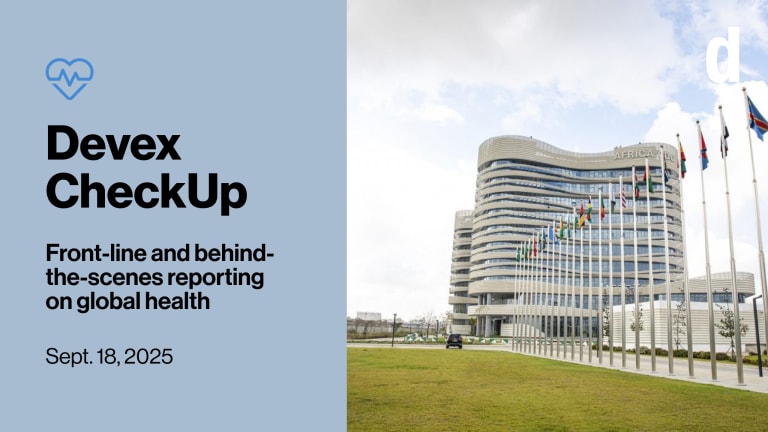
WASHINGTON — Despite progress, the CDC Group’s approach to investing in low-income and fragile countries could be more focused, more effective, and produce greater impact, according to a new report from the Independent Commission for Aid Impact released Tuesday.
Between 2012-2018, CDC, the United Kingdom's development finance institution, “made progress in redirecting investments to low-income and fragile states, but has been slow in building in-country capacity to support a more developmental approach” and has not done enough to monitor results, improve evaluation or apply learning, according to the report.
The report examined three primary subjects: whether CDC’s approach to achieving development impact and financial returns in low-income and fragile states is credible; whether its investments in those countries are effective; and how well the agency learns and innovates.
"This report shows that, despite recent progress, CDC is still not doing enough to make tackling poverty its top priority,” Oxfam’s head of government relations Jon Date said in a statement.
For Devex Pro subscribers: Interested in CDC's investments between 2012-2017?
Devex digs into the data behind DFIs to bring you emerging financing trends.
CDC responded that the review mainly looked at the organization’s performance between 2012-2016.
“Since 2017 we’ve introduced a whole host of changes to better understand and maximize our development impact, which means we’ve been able to make transformational investments in countries like Sierra Leone, Malawi and Nepal,” a CDC spokesperson told Devex via email.
“While we are confident that these recent improvements address many of the review’s suggestions, we’re motivated to improve further and welcome ICAI’s recommendations.”
ICAI decided to conduct the evaluation because of the growth of CDC’s importance within the U.K.’s aid work, and the influx of capital from the Department for International Development to CDC. Between 2015-2018, CDC received £1.8 billion ($2.37 billion) in new investments from DFID, with more expected in the coming years.
Risk-taking
CDC has been shifting its focus increasingly to low-income and fragile states in recent years, and in 2017 created a separate portfolio through which it can make higher-risk investments with the potential for greater development impact.
Q&A: Nick O'Donohoe on impact investing, CDC in India, and a riskier portfolio
As more mainstream investors begin to show interest in investing for impact, what is the role of development finance institutions? Devex speaks with CDC CEO Nick O'Donohoe.
Between 2012 and the end of 2017, the growth portfolio’s returns were 10.6 percent, which means that CDC could have pushed harder to achieve development impact, according to the report. While 53 percent of the investments made in the growth portfolio was in countries classified as “difficult investment environments,” many of those were focused in just a few countries with larger economies, such as Kenya and Nigeria, according to the report.
DFID has asked CDC to “be even more ambitious” with the catalyst portfolio, according to the report. In a recent conversation with Devex, CDC’s Chief Operating Officer Colin Buckley acknowledged the need to take on more risk, saying “one thing DFIs need to be more comfortable doing is rolling the dice for transformative impact.”

Better measurement
A theme throughout the report is that CDC has, in recent years, made progress on many of the shortcomings identified, but that the new policies could be more robust or better implemented.
This critique applies to how CDC has identified, measured, and managed impact. For years the institution’s measurement of development impact focused narrowly on jobs, for example.
“We believe that CDC should have done more to select impactful projects,” the report said. “Beyond the decision to invest, CDC did not set targets or expectations for development impact, nor did it do enough to encourage opportunities to enhance development impact. Until recently, it also monitored only a narrow set of metrics, making it difficult to assess CDC’s overall impact, both at the investment level and for the portfolio as a whole, for much of the review period,” the report reads.
The agency did redefine development impact in its 2017 strategic framework and is measuring based on impact on people and communities; companies and local economies; and broader capital markets, according to the report.
The report acknowledged these changes, including that CDC has integrated impact professionals into its investment teams and requires that a development impact case is developed for each potential investment. It recommended that the new processes and resources are quickly integrated.
To be more effective, CDC could also be better at ensuring that investments couldn’t be commercially financed, the report said. The institution lacks a strategy for mobilizing private finance, which could help its investments have more impact, despite it being a goal in the current strategic framework, according to the report. CDC has submitted a proposal with a new mobilization plan to the board, according to the report.
Staffing and collaboration
For Devex Pro subscribers: Profiling 17 development finance institutions
Devex delves into analysis and commentary of 17 bilateral development finance institutions.
The report also examined CDC’s staff and capabilities to operate in fragile contexts, urging more strategic geographic priorities and clear plans for various sectors — as well as the hiring to do it well.
CDC has grown its staff, in part to expand the direct equity investments it makes. In 2012, CDC had 47 employees, a number that grew to 308 by July 2018. CDC aims to have 450 staff by 2021 as it implements its new strategy. The agency had seven staff members in Africa by the end of 2017 but has plans to open four regional offices in Africa by 2019, with representatives in three additional countries, according to the report.
DFID and CDC could work together more closely at the country level, which would create more opportunities for collaboration and knowledge sharing, the report found. DFID responded to the findings, highlighting that CDC has taken steps to increase its development impact and expand its presence overseas.
“Over the past 3 years CDC investments have mobilised over [$3 billion] of additional private capital which have supported the growth of successful businesses in the world’s most challenged countries. These firms are creating jobs, providing essential services and boosting local tax revenues which help transform economies, lift people out of poverty and achieve the global goals,” DFID wrote in a statement to Devex.
Both DFID and CDC said they would respond to the ICAI recommendations in time.
Recommendations
CDC must better manage development, expand its impact criteria, improve monitoring and evaluation, and communicate how it is calculating the tradeoffs between financial risk and development impact, according to the report’s recommendations.
Specifically, CDC should develop a set of wider development impact criteria for the growth portfolio and provide more clarity on how development impact cases are weighted in the decision-making process. The report also stated that CDC should work more closely with DFID and other partners, especially in building geographic or industry plans and on sharing learning.
DFID’s future investments in CDC, meanwhile, should be based on stronger evidence of the effectiveness of its investments and clear progress toward addressing some of the challenges.
It is difficult to justify increasing the amount of aid spent through CDC until it can show unambiguously that it is willing to invest in a way that maximises the returns for the world's poorest,” Oxfam’s Date wrote, adding, “a reformed CDC has an important role to play in helping to grow the private sector in poorer countries.”
Search for articles
Most Read
- 1
- 2
- 3
- 4
- 5








